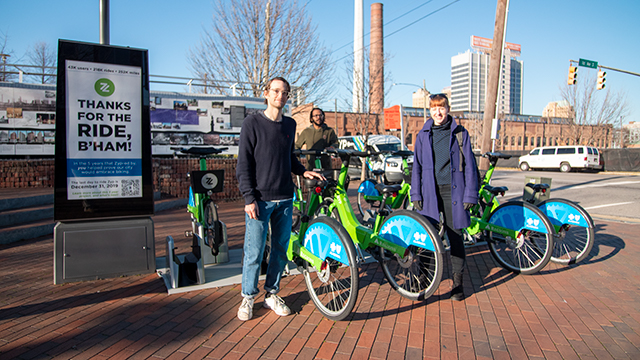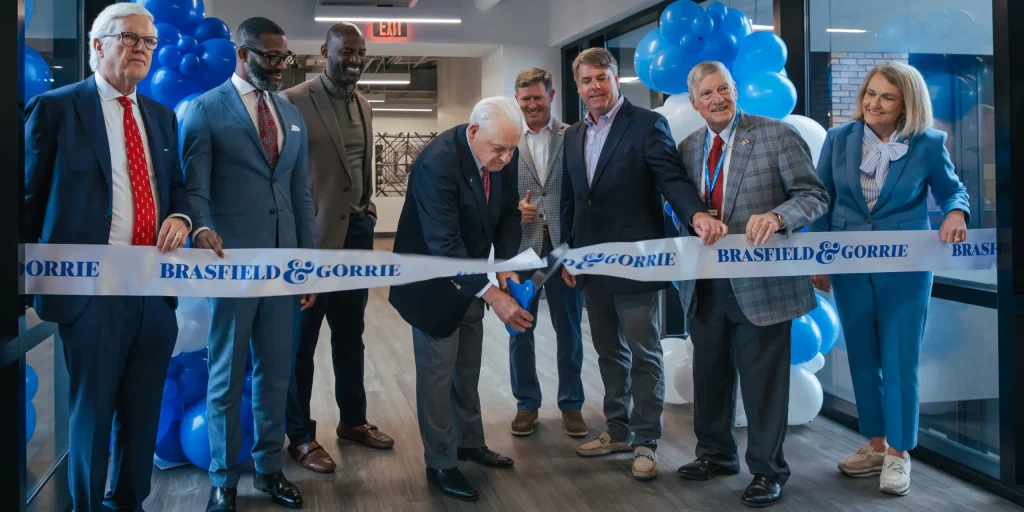After five years of successful operation, Birmingham’s Zyp bike-share program is winding down as leaders gear up to provide new transportation options for the central city in the coming year.
REV Birmingham, an economic development and revitalization nonprofit focused on creating vibrant commercial districts, launched Zyp in 2015 with a five-year commitment from partners and sponsors. The goal: to prove there was a demand for bike-sharing in Birmingham.
And prove it, Zyp did.
During its successful run, which ends Dec. 31, more than 43,000 users took more than 218,000 rides, logging more than 252,000 miles. Now, privately owned bike and scooter companies have shown a strong interest in offering services in Birmingham. City officials are negotiating with potential vendors, with plans to have new shared-use transportation offerings available in spring 2020 for residents and visitors, including electric bicycles and scooters – and potentially more options.
Birmingham’s Zyp changed bike-share programs across North America from Alabama NewsCenter on Vimeo.
“We are at the close of the Zyp era, and we feel very good about what we’ve accomplished,” said David Fleming, REV Birmingham president and CEO. REV partnered with Regions, BlueCross BlueShield of Alabama, the Alabama Power Foundation, Birmingham-Jefferson Convention Complex and the Community Foundation of Greater Birmingham to support Zyp.
“We set out five years ago with partners who believed in the potential of Birmingham joining the increasing number of cities implementing bike-share systems,” Fleming said. Indeed, Birmingham became the first city in North America to install a bike-share system that offered electric-assist bicycles, with 37 docking stations, powered by solar panels, spread across several central city neighborhoods.
“That was exciting – to do something that was state of the art. It got us a lot of positive attention as a city on the cutting edge, as far as the technology, and pointed to the progressiveness of Birmingham,” Fleming said.
Birmingham City Councilor Darrell O’Quinn chairs the council’s Transportation Committee and has been closely involved in planning for the upcoming transition from Zyp to new transportation options.
“Zyp bike share really allowed people to understand that bikes were a viable means of transportation and an amenity that would benefit the city,” O’Quinn said.
“If you use Railroad Park as a metaphor, Zyp was the Railroad Park for multimodal transportation in Birmingham,” O’Quinn said, referring to the popular green space built in the heart of the city that helped spark hundreds of millions of dollars of redevelopment projects in downtown Birmingham.
O’Quinn agreed with Fleming that Zyp helped to spread the word beyond the city’s borders that Birmingham was a city focusing on innovation. “It went beyond what was generally accepted and put the city on a lot of people’s radar. There were immediate benefits, but it also added to a more general perception – that Birmingham was a city where new ideas were possible.”
That growing perception, he and Fleming said, added to Birmingham’s allure – drawing more people to enjoy downtown, recruiting younger people to come to live and work in the city, and attracting new businesses and entrepreneurs. Fleming said he’s heard from several recent business arrivals and startups that the city’s bike-share system was among the amenities that helped to draw them to Birmingham.
Another mission accomplished with Zyp was to make bike share inclusive and accessible. The system not only offered discounts for lower-income individuals but pushed into nearby underserved neighborhoods. O’Quinn said city officials are committed to making sure the system that replaces Zyp, which will no longer require docking stations, provides even more opportunities to serve a wider number of users in even more neighborhoods.
O’Quinn uses terminology that many people may not be familiar with when talking about where bike share and other forms of alternative transportation are headed: shared micromobility.
“For what it was, Zyp bike share was very successful,” O’Quinn said. “From an external perspective, people could look to Birmingham and see we were doing something completely innovative. Now, following the natural evolution of the industry, we are looking to transition to what shared-use, micromobility has become. When Zyp started, that term hadn’t even been invented yet.”
O’Quinn and Fleming said Zyp also helped inspire progress toward another goal: making the Birmingham region, where automobiles have long dominated, more bike- and pedestrian-friendly.
For example, since ZYP’s creation, the city of Birmingham has adopted a “complete streets” plan designed to add more sidewalks and bike lanes over time.
Keith Rawls, the director of Zyp, said helping make the city a more friendly place for bicyclists was part of the mission.
“In addition to proving our residents and visitors would use bikes to get around Birmingham, Zyp has also been advocating for more bike-friendly environments and policies,” Rawls said. “After five years of Zyp, we’re seeing more people than ever getting out of their cars, enjoying the city by bike, foot and more – a trend we hope to see continue.”
Meanwhile, more leaders across the Birmingham metro are taking a harder look at how to make the region better for walkers and bicyclists through better infrastructure, including the expansion of greenways that provide alternate routes for people to get around without getting behind the wheel.
Since Zyp’s inception, the Regional Planning Commission of Greater Birmingham (RPCGB) – which conducted the early research and conceptual planning that preceded Zyp – has developed the B-Active plan – a visioning document for a broader multimodal transportation network for Jefferson and Shelby counties. It serves as a guide for the two counties and area municipalities to create more safe routes and better connections for walkers and bicyclists.
Hunter Garrison, a community planner at RPCGB, commutes by bicycle to his office from his home in the Crestwood North neighborhood, about five miles east of downtown. “I’ve spoken with many people who started bike-commuting with Zyp and liked it so much they went out and bought their own bike for commuting.
“Zyp has done a great job of increasing the visibility and profile of bicycling in the city,” Garrison added. He believes it also has had a positive effect, from a safety standpoint, on drivers. He said many local drivers have no interest in bike commuting themselves, but they are now more aware of bicyclists and the need to share the road.
He said the Zyp program has inspired elected officials’ interest in improving infrastructure for bicyclists. “Zyp was at the forefront of making the public realize that biking is a viable and fun way of getting around in Birmingham. That may be ZYP’s greatest legacy.”
O’Quinn said elected officials and community leaders are also exploring and testing other transportation ideas, inspired in part by the success of Zyp. He cited the city’s new Via microtransit pilot program, an on-demand ride-share program supported by the community foundation, which focuses on providing residents in underserved neighborhoods with more transportation options.
Meanwhile, the city is working with partners on final designs for the Birmingham Xpress, a new regional bus rapid-transit system designed to better connect the city and nearby communities. Construction is expected to be underway in late 2020.
Overall, O’Quinn said, there is a growing focus on “giving people options other than owning an automobile – which is not an option for everyone.”
“There is definitely a mentality and very strong intent that Birmingham should move in the direction that you don’t have to have a car to get around.”
(Courtesy Alabama News Center)













